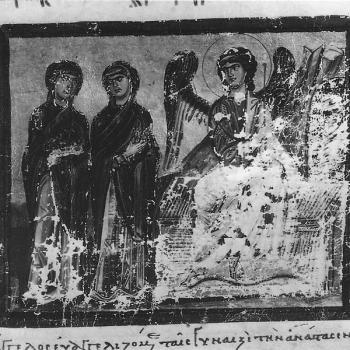By now, most have heard about Kansas City Chiefs kicker Harrison Butker’s speech made at Benedictine College. Between memes, celebrity responses, and social media commentary, his speech hit a nerve among a world that doesn’t quite agree on the future of faith, politics, and the overlap. While some virulently disagree, others defend his views and right to free speech. Others argue the internet’s propensity to malign statements, saying both social and secular media took his statements out of context.
In light of the controversy, I read his entire speech. If I am to be honest, I don’t particularly care about Harrison Butker as I am not interested in football. I never heard of him before this speech. I’m not interested in, nor moved, by his views about women or motherhood. What I do care about is faith, and accurate religious representation in the media. That being said, there are a few things noteworthy in his speech that are relevant, yet aren’t being discussed amidst the controversy.

1. He spoke from a traditionalist Catholic perspective
“Traditionalist Catholicism” isn’t a term familiar to most outside of religious studies majors, those who monitor religious trends, or who have practiced it or know someone who has. Regardless, the trend of Traditionalist Catholicism is on the rise, especially in the United States. Traditionalist Catholicism embraces the forms, rites, beliefs, customs, practice, and identity of Roman Catholicism prior to the Second Vatican Council (1962-1965). Known as a period of change in Catholic history, Vatican II introduced major changes to mass form, language, church layout, member participation, and attitudes about faith. Not everyone agreed with the changes, and the result were some who opted to embrace traditions withstanding between 1570 and 1970.
While this may draw images of Catholics standing around in outdated clothing while chanting in Latin, there are variations of Traditionalist Catholicism. Not all adherents attend Latin masses or believe Catholicism should retreat to the dark ages (although some go as far as to elect their own pope!). The majority of Traditionalist Catholics would be considered “conservative Catholics.” They adopt conservative standpoints on beliefs in response to decades of sex abuse scandals, clerical abuses, and a sense that Catholicism is losing its spiritual identity. Many lean toward extreme interpretation of church doctrine, including women as homemakers and mothers, modesty in attire, prohibition on all contraceptive use, and a central emphasis on the role of church authority in one’s personal spiritual life.
2. Not all Catholics embrace such views
As mentioned above, Traditionalist Catholic views aren’t well-known outside of specified circles. Roman Catholicism covers a broad spectrum of views across many countries and cultures. Contrary to popular belief, there are variations on Catholic views and practices, and not all Catholics agree about every issue. There are also variations in worship and style, such as Byzantine Catholics. While some matters are technically not up for debate, many Catholics (especially in the United States) vary in their perspectives, especially on contemporary issues.
For example, the Benedictine Sisters of Mount St. Scholastica made an official statement against Harrison Butker’s speech. Thousands joined together to sign a petition against it. On the inverse, a young Catholic woman spoke in support of it. Not everyone feels the same way about every issue, even from a Catholic perspective.
3. He spoke from a place of privilege
As a sports celebrity, Harrison Butker’s speech reflected his lifestyle. His five-year signing bonus totals over $4.5 million. Given this economic status, his wife has the option to adopt a homemaker lifestyle in accordance with his religious views. The majority of American families do not have this convenience, even if one partner desires to be a stay-at-home parent. The facts speak that if he wasn’t a celebrity athlete, his family probably wouldn’t have the option to entertain his beliefs.
Contrary to what might seem like “traditional belief,” there have always been women who worked throughout history. Whether due to financial status, career interest, or spiritual call, the idea that women should stay at home while men venture into society stems from Victorianism. The privilege of having a stay-at-home wife has always related to economic position.
4. Roman Catholicism has never been “counterculture”
There was one part of his speech that caused me specific concern, divided into two statements. The first was:
“Our Catholic faith has always been countercultural.”
The idea of any faith as “countercultural” is new, emerging somewhere between forty and sixty years ago (depending on who you ask). Finding an exact origin proved difficult, although one article pointed to a 1986 book written by Carl Henry. It is a decidedly American Evangelical term, one obviously borrowed from interactions with Protestant conservatives. Harrison Butker’s use of such in his speech was to indicate his views (which he assigned to religion) are not accepted by society. Whether this is the case or not isn’t for this column. What is for this column is that there has never been a point in history where the Catholic Church could be deemed “countercultural.”
From the earliest of centuries, Roman Catholicism proved a dominant force in western religion. From its influence in the Roman Empire, to its prominence in the Holy Roman Empire, to its historic prominence throughout much of the western world and beyond, the Roman Catholic Church is not, under any circumstances, an underdog of culture. As a dominant and oppressive force, the Catholic Church is well-known for things such as the Inquisition and persecution of Protestants during the Reformation. While I’m not accusing the Catholic Church of such today, that certainly doesn’t mean it is a persecuted force in American culture.
Likewise, claims of “counterculture” are not an excuse to behave unseemly or aggressive. Masculinity doesn’t have to equate to brute force. Men who stay home to care for children are no less men than breadwinners. If anything, the Bible’s call to love, compassion, obedience, and mutual submission calls alpha-male ideals into question.
5. Jesus was not Roman Catholic
I’ve often said that one of the most difficult things any believer will face is the challenge to accept Jesus as He is – for Jesus Himself. He doesn’t have blonde hair and blue eyes. Accepting that Jesus wasn’t part of our existing Christian denominations (no matter how much we may believe in their truth or relevance) is perhaps one of the hardest. As we struggle and strive to understand the role of Scripture, history, culture, and understanding, we do our best as we look through the glass darkly (1 Corinthians 13:12) and trust God’s grace by faith carries us.
But this struggle isn’t an excuse to remain ignorant, nor is it to create Christ in a comfortable image suitable to an argument. During Harrison Butker’s speech, he stated:
A lesson in the consequences of church politics
I see Harrison Butker’s speech as the ultimate consequence of what happens when we substitute faith for politics. Rather than speaking from a place of sincere faith, he spoke a conservative agenda under the guise of spiritual understanding. If we understand Christianity as a counterculture call, it shouldn’t so closely align itself with political ideals along any lines. When we allow ourselves to be so easily lured by the idea that a political ideology reflects our faith, we cease striving to embrace the Lord in a manner that changes and transforms us. Our call is not to align, but to change.
For whatsoever is born of God overcometh the world: and this is the victory that overcometh the world, even our faith. (1 John 5:4, KJV)
If we want to change the world, we need to make sure we ascribe to a Kingdom much higher than that present in Harrison Butker’s speech.














